The build up of amyloid-beta in the brain has been a prime target of Alzheimer’s drug developers, including Biogen with its controversial new drug Aduhelm, which was granted the go-ahead from the FDA in early June. Now Biogen competitor Prothena says its own monoclonal antibody binds to amyloid-beta with about 11 times more strength than Aduhelm (aducanumab).
In preclinical data presented Monday, Prothena said its fully humanized antibody targeting the N-terminus of amyloid-beta achieved greater avidity, or binding, than Aduhelm. The preclinical data showed the antibody could clear two main types of amyloid-beta plaque in the brain. The data was presented Monday at the Alzheimer’s Association International Conference 2021 in Denver.
The asset, dubbed PRX012, could also improve patient accessibility, if it makes it through the clinic, given its ease of delivery, said Hideki Garren, M.D., Ph.D., chief medical officer of Prothena, in an interview with Fierce Biotech. The next step: a regulatory filing in the first quarter of next year to set up PRX012 for clinical trials in 2022.
Prothena measured the binding ability of PRX012 using brain tissues from Alzheimer’s patients. With its stronger binding potential, PRX012 may be able to be delivered at a lower dose and be administered subcutaneously, or under the skin, “such that we achieve the same sort of concentration that aducanumab has with the IV administration,” Garren said. That delivery method would be easier for patients, because it wouldn’t require as much antibody per dose as is needed for the intravenous delivery of Aduhelm, and it could be administered at home, sparing patients from having to go to a hospital or clinic, he added.
Garren joined Prothena in April from Roche’s Genentech, where he worked on phase 3 clinical programs in multiple sclerosis and neuromyelitis optica spectrum disorder. Garren said the FDA’s green light for Aduhelm “really opened up potential accelerated pathways for other anti-amyloid beta” candidates.
Indeed, Aduhelm’s approval has given Prothena a major boost. Prothena’s share price has surged and the biotech inked a major deal with Bristol Myers Squibb. The Big Pharma is paying $80 million upfront for the exclusive U.S. license to Prothena’s other Alzheimer’s candidate, an anti-tau antibody, which is currently in a phase 1 trial. Prothena has the potential to reel in approximately $2 billion in milestone payments under that deal.
Also Monday, Garren said Prothena is in the process of identifying which of three potential Alzheimer’s vaccines it will bring forth for potential clinic trials. The biotech is still analyzing data from three different dual amyloid beta and tau vaccines that it is developing. The vaccine constructs are unique, Garren said, in that they target both amyloid beta and tau tangles, which present evidence of acting together in the progression of Alzheimer’s.
It’s not just the Aduhelm approval that’s accelerating the efforts of Prothena and other companies, Garren said. Advancements in basic biology and clinical development “will be quite meaningful for patients and for PRX012 in terms of getting this as quickly as possible to patients,” he said.

